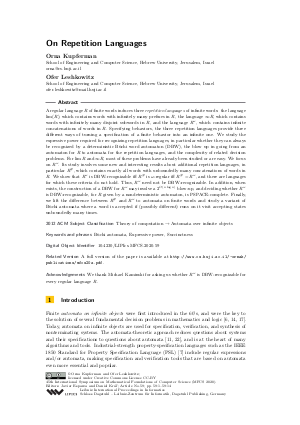@InProceedings{kupferman_et_al:LIPIcs.MFCS.2020.59,
author = {Kupferman, Orna and Leshkowitz, Ofer},
title = {{On Repetition Languages}},
booktitle = {45th International Symposium on Mathematical Foundations of Computer Science (MFCS 2020)},
pages = {59:1--59:14},
series = {Leibniz International Proceedings in Informatics (LIPIcs)},
ISBN = {978-3-95977-159-7},
ISSN = {1868-8969},
year = {2020},
volume = {170},
editor = {Esparza, Javier and Kr\'{a}l', Daniel},
publisher = {Schloss Dagstuhl -- Leibniz-Zentrum f{\"u}r Informatik},
address = {Dagstuhl, Germany},
URL = {https://drops.dagstuhl.de/entities/document/10.4230/LIPIcs.MFCS.2020.59},
URN = {urn:nbn:de:0030-drops-127268},
doi = {10.4230/LIPIcs.MFCS.2020.59},
annote = {Keywords: B\"{u}chi automata, Expressive power, Succinctness}
}

 Creative Commons Attribution 3.0 Unported license
Creative Commons Attribution 3.0 Unported license























